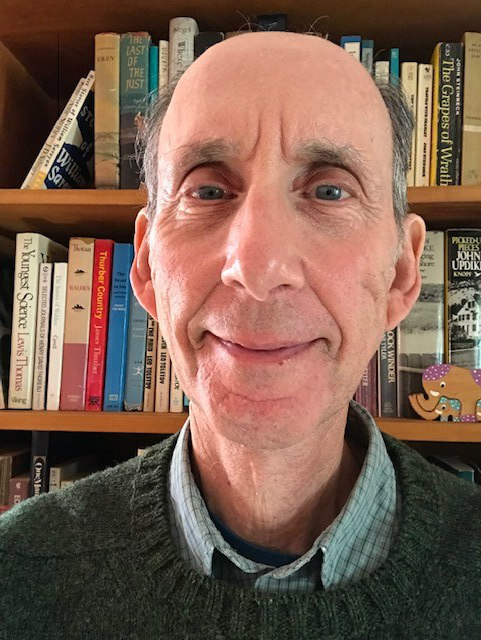
“Blessed are You, Sovereign of the universe, who fashions within our minds the gift of memory, and who grants us the ability to remember.”
Five years ago on Rosh HaShanah morning, as the morning sunlight filtered through the stained glass windows of Temple Emanu-El’s sanctuary in Sarasota, FL, I glanced up from my prayerbook and looked out over the crowd of worshippers sitting around me and saw so many faces in our community that I didn’t recognize. I wondered: Where had they come from? What stories did they have to tell about being Jewish? What does Jewishness mean to them?
That’s when the idea came to me: What if we invited our congregation’s members to share stories about their Jewish experiences?
I reached out to Rabbi Brenner Glickman, who encouraged me to seek out stories and even directed me to members he thought might be willing to participate. Half a decade later, almost 40 members have contributed to this Jewish memoir-writing project, which can be found on the temple’s “Our Jewish Stories” site. During Yom Kippur 2020, thanks to the miracle of Zoom, Rabbi Glickman invited a handful of writers to read their stories aloud as the rest of the congregation tuned in. (The program can be viewed on YouTube.)
As Jews, we are familiar with the idea of remembering. Rosh HaShanah is also known as Yom HaZikaron, the Day of Remembrance (not to be confused with Israel’s Memorial Day of the same name). At Passover, and when we recite Kiddush on Friday nights, we remember the exodus from Egypt. Throughout the year, we remember our people, our struggles, and our victories. And, of course, there is Kaddish, the prayer that we say when we are in mourning, and which we recite at yizkor – a word that means remember – when we call to mind those we love who are gone.
Perhaps you have a Jewish story that you’d like to tell and share with your family or temple community? If so, I have a few suggestions below to help you find a way to get your story on paper, but before we get to those...
What is a memoir?
Think of a memoir as describing a pivotal moment or period in your life which you try to recreate through storytelling. Your feelings and assumptions are central to the narrative, and you have more flexibility than in an autobiography, which relies on your entire life and focuses solely on facts. Memory is malleable, so you can tell the story as you remember it and focus on your feelings and assumptions. It can be told chronologically, or not.
Our memories can be filled with love and joy, with laughter and kisses and hugs, with tastes and smells, with sights that brought us much pleasure at one time in our life. But some of our memories can be dark and dangerous, filled with people and events we’d rather forget, times we weren’t our best selves or experienced disappointment, fear, anger, or loss. They can be places we don’t want to ever return to, places we’ve blocked off with yellow police tape warning us: "Do not cross!" But if (and only if ) ou feel comfortable crossing that line, they can offer rich material to tell your story.
Here a handy three-step process I believe you’ll find very helpful when writing your memoir and help you tell the best story you possibly can.
I. Find a memory.
When you first begin writing, ask yourself a few key questions:
- What do you want to remember?
- What do you want to share?
- What do you want people to know about you and your life?
- What do you want to know about yourself?
To help find the right memories, look through some of your old photographs, home movies, journal entries, letters, magazines, newspapers, anything that can reveal what you want to share. Give yourself the freedom to also rely on the intangible:
- What’s your own memory of an experience?
- What stories did your family tell?
- What smells, tastes, and sensations still linger to this day?
Maybe it’s the smell of Friday night Shabbat dinner, the feel of your parent’s , the sweet taste of apples and honey on Rosh HaShanah. Whatever comes to mind, let it serve as potential fuel to tell your story.
To help give your memoir an even stronger Jewish angle, think of key people in your life who inspired you to be Jewish or practice Judaism:
- What events sparked your awareness of being Jewish?
- Do you have Jewish rituals or ritual items that you find most meaningful and spark memories?
- Was there a time when you ever felt fearful or proud of letting people know you’re Jewish?
The kind of memoir you write will depend on your memories and your ability to recapture what you remember on paper, and on your willingness to look back—honestly, unflinchingly—into the past.
2. Write down the details.
Every memoirist has their own preference for how they write their story. What method of writing appeals the most to you? Some prefer typing at a computer or a typewriter, some prefer writing in a journal or a notebook. If so, I highly recommend finding a favorite pen to make the process all the more special (I’ve started using a fountain pen!)
Whatever method you prefer, use the prompts above to jot down as many details as you can remember: conversations, images, senses, etc. You don’t have to write them chronologically or even focus on proper grammar and spelling for now; just write them down as they come to you and as detailed as possible. If you’re the type of person who views your memories as a film, hit rewind and fast-forward as much as you need and notice what stands out the most.
Afterward, put what you’ve written aside for a day or two, come back to it fresh, and look at what you created with your own words. Where are the emotions strongest and the images most clear? Once you’ve determined all of this, you’re ready to move forward.
3. Shape the story.
Here is where you can craft the details of your memories into a story that so others can experience it through your words. This is the part a lot of new memoirists may struggle the most, so I have a few tips to help you tell the best and most authentic story you possibly can.
To start, consider the type of narrative you want to tell. What conflict or specific dramatic moments exist in your story? Where is any tension coming from? Are you in the story, or just the narrator? What dialogue can you use to best draw in readers? Think about why each memory is important to you and why you want to share it. Make sure you’re telling your story in a natural, authentic fashion and conveying its depth in an intimate way.
Additionally, one piece of advice a writing teacher once gave me is to begin at the beginning and write all the way to the end. This begs the question, however: Where does one know where to begin? In the middle of the action, before the action starts, or after it’s over – using the story as a flashback? Ultimately, it’s up to you! Regarding when to end the story, listen to your gut. When do you feel the story shut like a door? When do you hear that satisfying “click”? That’s when you know you can bring your memoir to a proper end.
I highly recommend reading other memoirs to see how other writers shape their stories. If you’re looking for Jewish memoirs to read, here are a few I recommend:
- Miriam’s Kitchen by Elizabeth Ehrlich
- If All the Seas Were Ink by Ilana Kurshan
- Kaddish by Leon Wieseltier
- Patrimony by Philip Roth
- A Tale of Love and Darkness by Amos Oz
- Night by Elie Wiesel
- When Memory Comes by Saul Friedländer
- The Color of Water by James McBride
- Memoirs of a Jewish Extremist by Yossi Klein Halevi
- Unorthodox by Deborah Feldman
- When We Were Arabs by Massoud Hayoun
- The Holy Thief by Mark Borovitz
- Surprisingly Happy by Sheila Peltz Weinberg
Happy writing!

